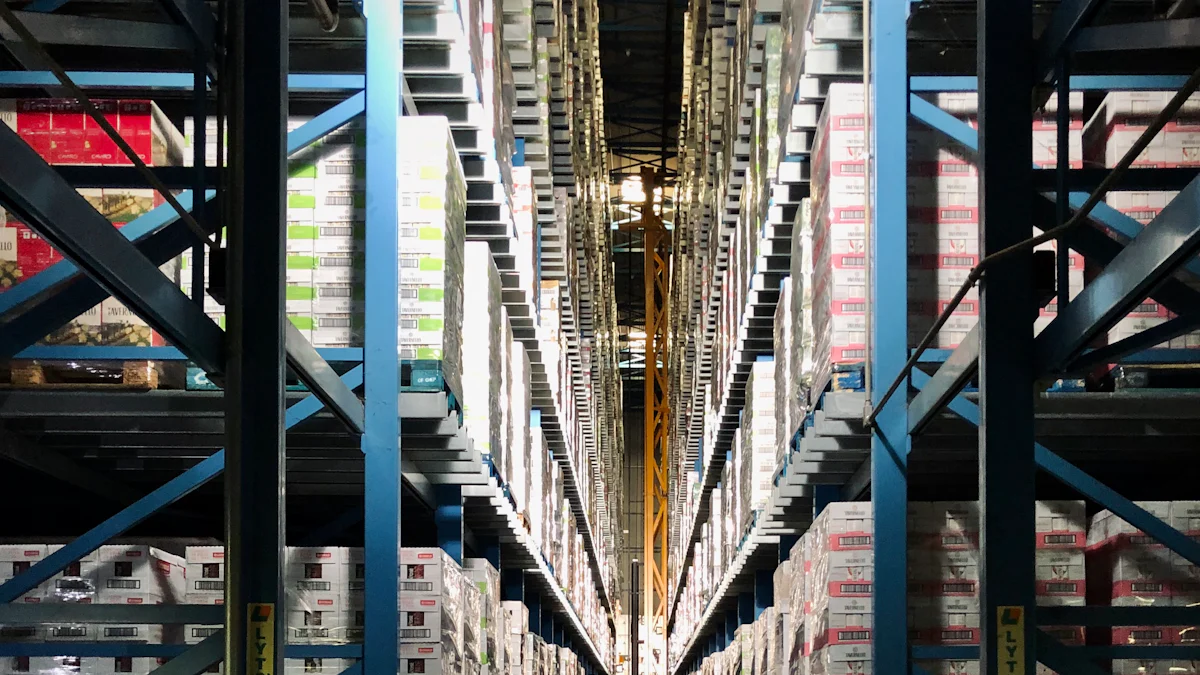AI Supply Chain: Revolutionizing Tomorrow's Logistics

AI supply chain is reshaping the landscape of logistics, offering innovative solutions to streamline operations and enhance efficiency. With AI supply chain technologies on the rise, businesses are leveraging artificial intelligence to optimize their supply chain processes. The significance of AI in modern logistics cannot be overstated, as it revolutionizes how goods are transported and managed across borders. This blog provides a comprehensive overview of the role of AI in supply chains, exploring its impact on production, inventory management, and distribution.
AI Supply Chain Overview
Definition and Scope
Artificial intelligence (AI) in the supply chain is a transformative technology that utilizes advanced algorithms to optimize logistics processes. AI in the supply chain involves the application of machine learning and predictive analytics to streamline operations, enhance efficiency, and drive strategic decision-making. The scope of AI in logistics extends across various functions, from demand forecasting to inventory optimization, offering unprecedented insights into supply chain dynamics.
What is AI in Supply Chain?
The integration of AI in the supply chain refers to the use of intelligent systems and algorithms to automate tasks, analyze data patterns, and improve operational outcomes. By leveraging machine learning models, organizations can extract valuable insights from vast datasets, enabling proactive decision-making and agile responses to market fluctuations.
Scope of AI in Logistics
The scope of AI in logistics encompasses a wide range of applications that revolutionize traditional supply chain practices. From route optimization using real-time data analysis to predictive maintenance for fleet management, AI technologies are reshaping how goods are sourced, produced, and delivered globally.
Current Market Trends
The adoption of AI technologies in the supply chain is witnessing exponential growth due to its proven benefits in enhancing operational efficiency and driving cost savings. With a projected growth rate of 38.8% during the forecast period, the market value of AI in logistics is set to soar as businesses recognize its potential for transforming their operations.
Growth Rate and Market Value
The market for AI solutions in supply chains is experiencing rapid expansion as companies seek innovative ways to optimize their processes. By harnessing the power of artificial intelligence, organizations can achieve significant improvements in productivity, accuracy, and customer satisfaction levels.
Key Players and Innovations
Leading players in the industry are investing heavily in developing cutting-edge AI solutions tailored for supply chain management. From autonomous vehicles for last-mile delivery to predictive analytics tools for demand forecasting, these innovations are revolutionizing how logistics networks operate on a global scale.
Key Areas of Impact

Supply Chain Planning
AI supply chain technologies are transforming the landscape of supply chain planning, offering innovative solutions to enhance production, inventory management, and product distribution. By leveraging artificial intelligence (AI) tools, organizations can optimize their processes and streamline operations for increased efficiency.
Enhancing Production
Implementing AI in supply chain planning enhances production processes by automating decisions and interacting with supply chain systems. This results in optimized inventory levels, reduced waste, and improved operational efficiency. Companies utilizing AI technologies experience increased efficiency, accuracy, and visibility in their operations.
Inventory Management
AI-driven supply chain optimization plays a crucial role in balancing inventory levels and reducing lead times. Through sophisticated algorithms and big data analysis, organizations can achieve optimized inventory management strategies that minimize excess stock while ensuring products are readily available when needed.
Product Distribution
The integration of AI in supply chain planning revolutionizes product distribution by optimizing route planning and enhancing predictive maintenance. By leveraging intelligent systems for last-mile delivery logistics, businesses can ensure faster deliveries and cost savings while maintaining high service levels for customers.
Operational Efficiency
Incorporating AI into supply chain operations drives operational efficiency by enabling cost savings, faster deliveries, and increased overall efficiency. Artificial intelligence tools empower businesses to make data-driven decisions that enhance their competitive edge in the market.
Cost Savings
One of the key benefits of using AI in the supply chain is achieving significant cost savings through optimized processes and resource allocation. By automating decision-making processes based on real-time data analysis, organizations can reduce operational costs while improving productivity.
Faster Deliveries
With AI-powered logistics services advancing supply chain management practices, businesses can ensure faster deliveries through efficient route planning and real-time monitoring. This results in improved customer satisfaction levels and enhanced competitiveness in the market.
Increased Efficiency
The potential of AI in supply chain management lies in its ability to automate decisions and reshape the industry through self-learning capabilities. By interacting with supply chain systems seamlessly, artificial intelligence optimizes operations for increased efficiency across all aspects of the logistics network.
Predictive Analytics
Utilizing AI for predictive analytics enables businesses to forecast demand trends accurately based on market patterns and historical data analysis. By leveraging AI algorithms for demand forecasting, organizations can make informed decisions that drive strategic growth opportunities within their supply chains.
Generative AI
Generative AI is a transformative technology that offers valuable insights and optimization strategies for supply chain management. By leveraging Generative AI, organizations can enhance decision-making processes, streamline operations, and drive strategic growth opportunities within their supply chains.
Insights and Optimization
Implementing Generative AI in supply chain management provides organizations with actionable insights to optimize their operations efficiently.
Through sophisticated algorithms and predictive analytics, businesses can make informed decisions that drive operational excellence and maximize efficiency.
The integration of Generative AI tools enables companies to identify key areas for improvement, enhance productivity levels, and achieve sustainable growth within their supply chain networks.
Sustainability
Utilizing Generative AI in supply chain management accelerates processes from design to commercialization, enabling faster innovation and adaptation to new materials.
By optimizing supply chains for sustainability, organizations can reduce carbon emissions, minimize environmental impact, and contribute to a greener future.
The application of Generative AI helps identify opportunities for sustainable practices, driving eco-friendly initiatives that benefit both the business and the environment.
Risk Management
Generative AI algorithms play a crucial role in identifying patterns and trends that are challenging to spot using traditional methods.
By enhancing risk mitigation strategies through advanced data analysis, organizations can proactively address potential risks and ensure operational resilience.
Leveraging Generative AI in risk management empowers businesses to make informed decisions that protect their supply chains from disruptions and uncertainties.
Future Prospects

Innovations on the Horizon
Emerging Technologies
The future of AI supply chain is brimming with exciting possibilities, especially in the realm of emerging technologies. One such innovation is the integration of Generative AI, a cutting-edge technology that revolutionizes supply chain optimization and risk management. Studies have shown that Generative AI can create models for managing inventory, generate optimized routes for logistics, and even create digital twins for risk assessment. This innovative approach empowers businesses to streamline their operations and enhance efficiency through advanced algorithms and predictive analytics.
Another emerging technology set to transform the landscape of logistics is the use of AI-powered drones for last-mile delivery. These autonomous aerial vehicles are equipped with state-of-the-art navigation systems and real-time data analysis capabilities, enabling faster and more efficient deliveries. By leveraging drone technology in logistics, businesses can overcome traditional challenges in urban areas and remote locations, ensuring timely deliveries and cost-effective operations.
Potential Developments
Looking ahead, the potential developments in AI supply chain are vast and promising. One key area of focus is the democratization of supply chain insights through Generative AI. This technology empowers supply chain talent by enhancing forecasting accuracy, streamlining procurement processes, and providing contextualized insights for better decision-making. By democratizing access to valuable data-driven insights, businesses can optimize their operations, reduce costs, and drive strategic growth opportunities within their supply chains.
Additionally, the future holds great promise for enhancing supply chain resilience and efficiency through Generative AI. Studies have highlighted that this transformative technology helps enterprises become more resilient, sustainable, and adaptable to market dynamics. By accelerating processes from design to commercialization and transforming cost structures through optimized strategies, Generative AI paves the way for a more efficient and agile supply chain ecosystem.
AI technologies in Supply Chain Management are rapidly evolving, offering sophisticated solutions for logistics challenges. Predictive analytics, powered by AI, optimizes inventory levels and enhances operational efficiency. Advanced analytics enables focused insights into supply chain operations, fostering resilience globally.
AI-driven Automation in Logistics streamlines inventory management and order processing efficiently. Companies like Amazon, Tusimple, and Nuro invest in transport automation technologies to enhance logistics operations.
Artificial intelligence is pivotal for supply chain optimization, ensuring intelligent decision-making processes and resilient supply chains. AI's role in managing global supply chains boosts efficiency and competitiveness across industries.
See Also
Innovative Logistics: How Supply Chain Revolutionizes Operations
Future of Logistics Technology: Breakthrough Insights
Insights into AI Integration in Future Supply Chains
Discovering Supply Chain Efficiency: A Quick Assessment
Efficient Solutions for High-Tech Manufacturing Supply Chain Challenges
